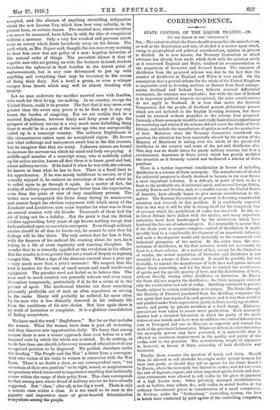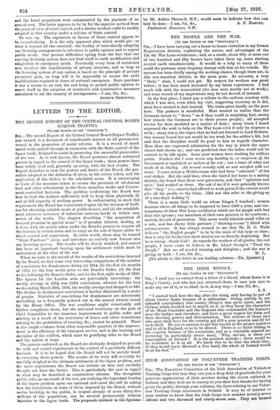CORRESPONDENCE.
STATE CONTROL OF THE LIQUOR TRAFFIC.—IV.
(To THE EDITOR OF T® " SPEOTATOR."1 Srs„—The extent to which the State should monopolize the manufacture, as well as the distribution and sale, of alcohol is a matter upon which: owing to geographical and political considerations, opinion • at present is divided. As is now known, the Treasury Committee to which reference has already been made, which dealt with the question solely as it concerned England and Wales, confined its recommendation to the acquisition of breweries and licensed houses. The omission of distilleries from the proposed scheme was due to the fact that the number of distilleries in England and Wales is very small. On the assumption that a general scheme for the whole of the United Kingdom is impossible (and in licensing matters, as distinct from fiscal arrange. ments, Scotland and Ireland have hitherto received differential treatment), the omission was explicable ; but while the case of Ireland- is in important political respects exceptional, the same considerations do not apply to Scotland. It is true that under the Scottish Temperance Act the people of Scotland possess plebiscitary powers which are not included in the English licensing statutes, but these could be retained without prejudice to the scheme here proposed. Certainly a State monopoly would be materially limited in its opportunity for restriction and reform if the scheme did not cover the whole of Great Britain, and include the manufacture of spirits as well as the production of beer. Moreover, since the Treasury Committee considered the, question the situation has been materially altered by the action of the Ministry of Munitions in taking over the whole of the patent-still distilleries in the country and some of the pot-still distilleries also. This step was no doubt taken for purely military reasons, but it is a revolutionary departure in State action which has greatly modified the situation as it formerly existed and facilitated a scheme of State purchase.
There is a further important consideration in favour of including
distilleries in a scheme of State monopoly. The manufacture of alcohol for industrial purposes is clearly destined to become in the near future a most important industry. It is difficult, in point of fact, to fix a limit to the profitable use of industrial spirit, and several foreign States, notably Russia and Sweden, and, to a smaller extent, the United States of America, have already begun to give serious consideration to the matter. The Russian Government at present is devoting considerable attention and research to this problem. It is confidently expected that in this way it will be able to recoup itself for the temporary loss of revenue which the prohibition of vodka has involved. So far, wo in Great Britain have dallied with the matter, and many important industries have been handicapped by the restrictions which have hindered the free use of industrial spirit. It is reasonable to assume that if the State were to acquire complete control of distillation, it might speedily lead to a considerable development of an important industry, and such a development would add materially to the commercial and industrial prosperity of the nation. At the same time, the non- inclusion of distilleries, is the first instance, would not necessarily be fatal to a State scheme. As a matter of fact, except for the limitation of results, the actual acquisition of breweries and distilleries is not essential to a scheme of State control. It would be possible, but not desirable, to control the manufacture of both beer and spirits without direct State ownership, and for the State to control the rectification of spirits and the specific gravity of beer, and the distribution of both, without directly owning either distilleries or breweries. In Russia the State did not acquire the distilleries ; the State monopoly covered only the rectification and sale of vodka. Distilling continued in private hands, subject to certain restrictions as to output. The State (through the Ministry of Finance) purchased from the distilling companies the raw spirit that was required in each province, and it was then rectified and purified under State supervision, partly in State rectifying establish. meats, and partly by private rectifiers at a fixed charge. Elaborate precautions were taken to secure strict purification. Each monopoly district had a chemical laboratory in which the purity of the spirit delivered was tested, and there were in addition two central laboratories (one at Petrograd and one at Moscow) to supervise and control the work of the provincial laboratories. Whatever defects in other directions the monopoly system may have possessed, it is undeniable that it effected an enormous improvement in the quality and purity of the vodka sold to the peasants. The overwhelming weight of argument is, however, in favour of State ownership of both distilleries and breweries.
Finally, there remains the question of hotels and clubs. Should
these be allowed to sell alcoholic beverages under special licences for their own profit, or should they sell as agents for the State Board ? In Russia, where the monopoly was limited to vodka, and did not cover the sale of liqueurs, cognac, and other imported spirits, hotels and first- class restaurants were allowed to sell vodka by the glass on payment of a high licence duty. Other privately managed establishments, such as buffets, wine cellars, &c., sold vodka in sealed bottles at the ordinary Government prices in consideration of a small commission. In Norway, under the " Gothenburg " controlling system, the bars in hotels were conducted by paid agents of the controlling companies,
and the hotel proprietors were compensated by the payment of an annual rent. The latter appears to be by far the superior method from the point of view of strict control, and a similar method could be readily adopted in this country under a scheme of State control.
To suns up. The arguments in favour of State control appear to be overwhelming. It is the only apparent plan which would give us what is beyond all else essential--the facility of immediately adapting our licensing arrangements to advances in public opinion and to urgent public needs. Our present difficulties spring from the fact that our existing licensing system does not lend itself to swift modification and adaptation to emergency needs. Practically every form of restriction now involves the consideration of private interests, and so long as the licensing system of any nation is based on the principle of private pecuniary gain, so long will it be impossible to secure the swift modifications required in times of national emergency. State purchase is but a means to an end, the end being to permit public opinion to assert itself in the adoption of restrictive and constructive measures salculated to rid the country of intemperance.—I am, Sir, &c.,
ARTHUR SHEAWELL.































 Previous page
Previous page